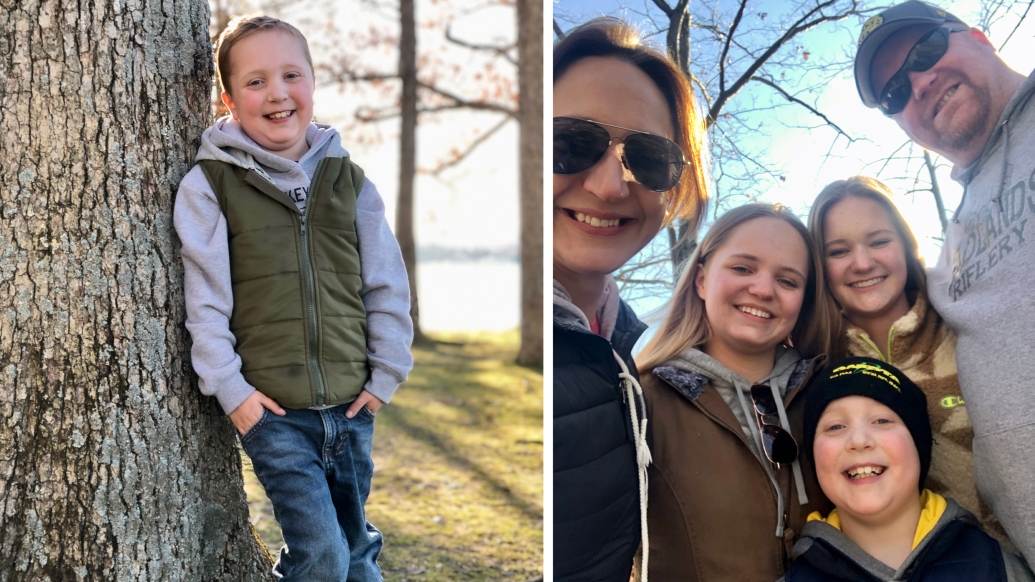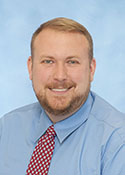
Ten-year-old Brady Thompson spends several days a week challenging his body, often on a treadmill, through “around the world” basketball games with his physical therapist or climbing a rock wall.
He and the University of Michigan Health pediatric physical medicine and rehabilitation care team have one mission: to make his new heart stronger.
Brady’s family temporarily moved to Ann Arbor in 2023 more than 1,000 miles away from their home in South Dakota so Brady could receive a heart transplant at U-M Health C.S. Mott Children’s Hospital.
For the third grader, his transplanted heart is the key to safely doing many of the things he’s always wanted to do: play sports like football and basketball, go swimming and eat as much hot sauce as he wants.
“We went from watching him decline from a failing heart to getting stronger and having more energy every day,” his mom Terisa Thompson said. “It’s been a complete 180. There’s so much more hope and an overwhelming feeling of gratefulness.”
A complex heart journey
Brady was born with hypoplastic left heart syndrome, characterized by underdeveloped structures on the left side of his heart.
Doctors discovered he had a congenital heart disease in utero during a 20-week ultrasound. Thompson and husband, Mac, were told Brady would need three complex open heart surgeries between birth and age three.
They learned that the congenital heart center at Mott had one of the most experienced teams for single ventricle surgeries in the country. The only problem: Ann Arbor was nearly 1,300 miles away from their farmhouse in Buffalo, South Dakota.
“At first we didn’t think there was any way we could go that far,” Thompson said, noting their daughters Sydnee and Sloan were just five and seven years old at the time. “But after doing more research about the experience and outcomes at Mott and flying out there to meet the surgeon we were confident that this was where we needed to be.”
They met with Mott pediatric heart surgeon Richard Ohye, M.D., co-director of the hospital's congenital heart center, and were immediately put at ease, she remembers.
So the couple packed up their things and young daughters for the 19-hour car drive to Michigan where they’d stay until Thompson was ready to deliver at U-M Health Von Voigtlander Women’s Hospital. They relied on family and friends to help care for their large cattle ranch and business.
“It was a big life adjustment and scary to make that kind of move while pregnant with young kids and leaving behind so much at home,” Thompson said. “But we’d do it all over again.”
Watching helicopter leave to pick up a heart
Brady’s first two surgeries at birth and again at six months old went smoothly. After his third one as a toddler, he experienced a complication associated with the Fontan heart procedure known as protein-losing enteropathy. It causes protein loss that can be life threatening if it affects multiple organs.
Heart medications helped him regain heart function but his family knew it was a temporary fix.
Over the next several years, Brady was monitored regularly by his local cardiologist, with constant communication between care teams in South Dakota and Michigan. But in 2022, his heart began to show signs it was failing.
“We noticed a significant decrease in energy and swelling, which likely meant his oxygen saturation was declining and he was retaining water. It no longer felt safe being that far away. We knew what was coming,” Thompson recalled.

The family returned to Ann Arbor to see Mott pediatric cardiologist and medical director of the pediatric heart transplant program, Kurt Schumacher, M.D.
He confirmed what they already knew: It was time for Brady to get on the heart donor waitlist.
So in November 2023, the family packed up again to make the long trek and settle into a rental home in Michigan in preparation for a long hospital stay.



